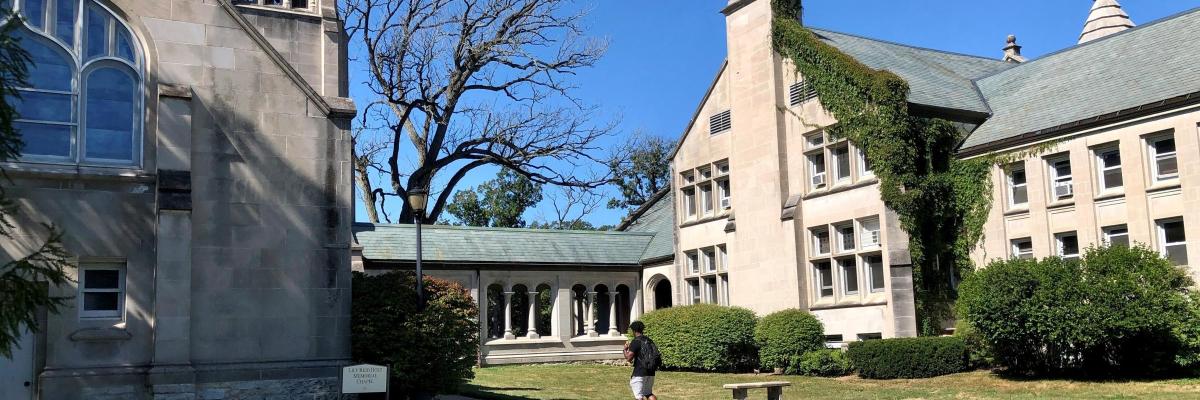The Academy is a core program of the Music Institute of Chicago, a national leader in music education for more than 90 years. The Academy conservatory program, for highly gifted string and piano students, is designed to be the primary musical experience in a student’s life.
Curriculum Includes
- Private Instruction
The heart of an Academy education. Students study with their own teacher or MIC’s renowned artist faculty. Accepted students participate in all aspects of the curriculum, including private lessons, chamber music, chamber orchestra, and accelerated theory classes. Pianists also study keyboard history, literature and skills, and keyboard improvisation in an intimate group setting. - Chamber Music
Weekly coachings with artist faculty, scheduled rehearsal time, performance classes, and regular ensemble concerts make up the robust program. Students are carefully prepared for international, national, and regional competitions and are coached by award-winning Academy Artist faculty. The chamber music program has resulted in numerous awards since its inception in 2006. - Enrichment
The only program of its kind to offer regular master classes, discussion panels, lectures, and workshops with professional experts and masterful pedagogues who provide students a broader view of the world of music. - Chamber Orchestra
Performance opportunities and a challenging repertoire, in an intimate ensemble, is offered to violinists, violists, cellists and bass students. - Performances
Philanthropic, civic, educational, and outreach opportunities, as well as paid engagements, are provided to Academy students in settings throughout the Chicagoland area. - Music Theory & History
Academy students all study music theory and history at a level appropriate to their skills.- music theory/history
- solfeggio
- ear training, rhythmic and melodic dictation
Career Development & Counseling
Academy students receive advice and guidance from President Mark George, Academy Director Jim Setapen, and artist faculty on competitions, college auditions, conservatory programs, instruments, summer festivals, and much more.
Networking
The Academy offers students opportunities to connect with peers, alumni, teachers, conservatory professors, conductors, and managers.
The Academy Program
Daily Curriculum - Strings and piano
Ages 14* – 19 (gap years are considered)
- Classes begin mid-September and run through May
- Saturdays 9:30AM to 6:00PM
- Students are permitted to arrive as early as 8:15AM to practice.
- All components of the comprehensive curriculum are mandatory.
- Students are expected to be available for the entire day on Saturday. There are three dress rehearsals n Friday evenings in Evanston from 6:00PM-9:30PM and seven concerts that will occur on Saturday evenings in Evanston or other MIC campuses.
- One-hour private lesson off-site during the week (or additional lessons as requested)
- One-hour chamber music coaching
- One-hour chamber music rehearsal
- Two-hour chamber orchestra rehearsal
- Theory classes, multiple levels
- Piano literature/improvisation/keyboard skills class (pianists only)
- Enrichment/Masterclasses
Other Program Components
- Audition and competition preparation
- Introducing your piece to an audience (two classes) - students introduce their piece (insight about the composer) on chamber concerts and compete for the best audience presenter.
- Performance opportunities
- College and conservatory recommendations, summer programs, and career counseling
A Typical Saturday
9:30 – Music theory and history classes
10:50 – Break
11:00 – Orchestra for string students and piano literature and improvisation for piano students
1:00 – Lunch
2:00 to 4:00 – Chamber music (one- hour with coach, one-hour students work without coach)
4:00 Break
4:30 to 6:00 – Enrichment (master classes, workshops, lectures)
Program Attendance
The Academy absence policy was updated in 2023 in an effort to reduce late arrivals, mid-day absences, and early departures, thereby strengthening chamber music and orchestra attendance.
A. Up to six absences (eight for seniors) from music theory, piano group
classes and chamber music are permitted as long as the student makes up
the theory or piano work (and does not fall behind in the class), and as
long as the chamber music sessions are made up with and without the
coach, in the same way they would have taken place if the student were
present.
B. Students may miss up to six Enrichments (eight for seniors) that do not
involve their personal participation.
C. Students must attend as much of the Academy as they can, on a day
when they have a partial absent.
D. Students may miss up to five orchestra rehearsals in a year, except for the
dress rehearsals (three Friday evenings on the day before the concerts).
If they are absent for more than five, they will sit in the last chair of their section
for the concert.
If they miss the dress rehearsal, their parents are required to pay the cost of a
professional substitute (for the dress rehearsal and the concert). It is at the
discretion of the conductor, if they will be allowed to play the concert if they miss
the dress rehearsal.
Students must let the Academy staff know at least two weeks before a planned
absence. Illness will be considered on a case by case basis.
E. Students will consult with the conductor the week after an absence on
points they missed from that rehearsal.
F. Students who miss more than two weeks in a row, of orchestra rehearsals, will lose the
opportunity to play on the first chair in that concert series.
G. Every orchestral absence beyond five will result in a fee of $100 that will
be billed to the family.
H. The Saturday of the Fischoff National Chamber Music Competition and the St. Paul String Quartet Competition, are not included
in the list of absences since so many Academy students often participate.

